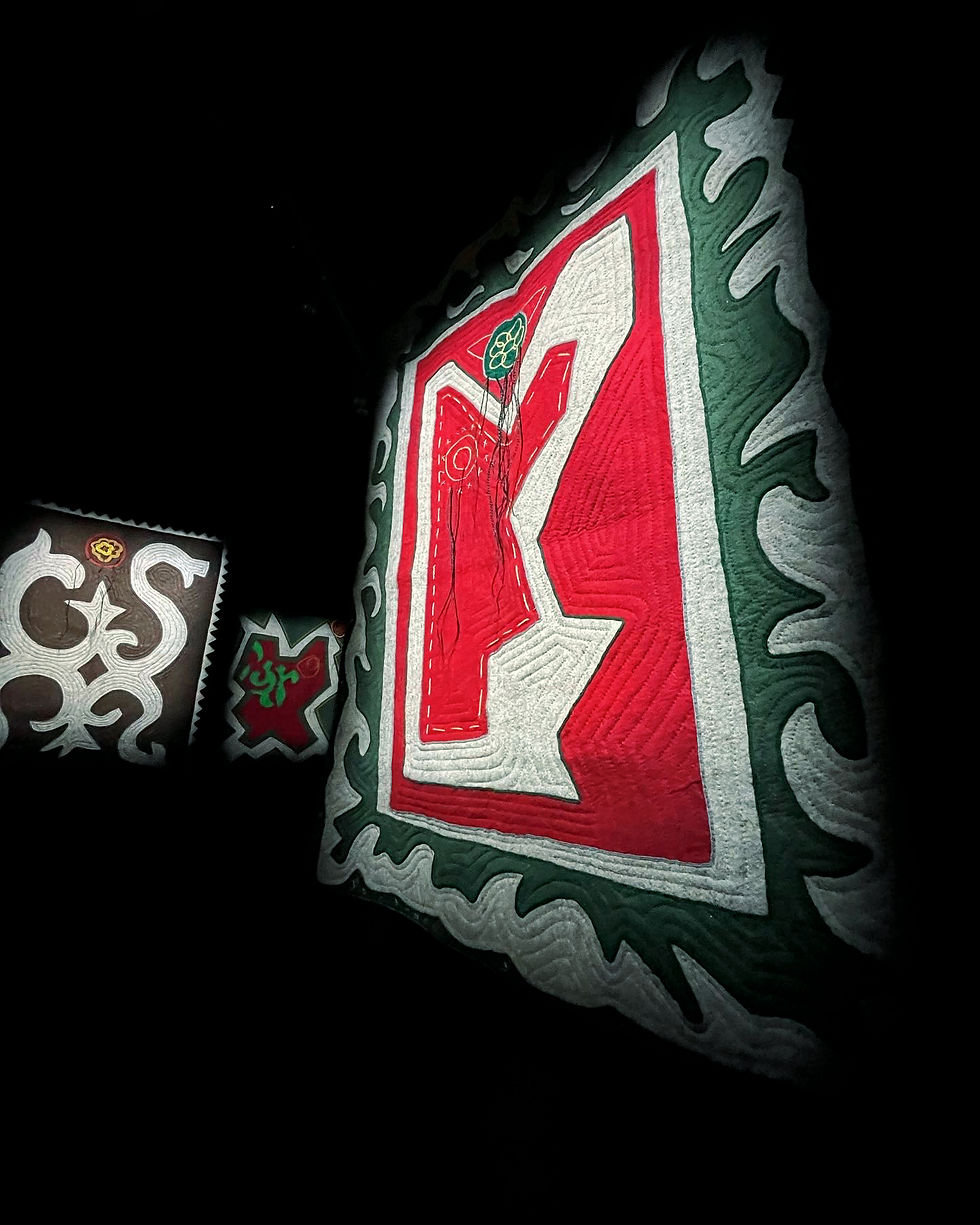
At Chiltern Firehouse, we unexpectedly run into Iranian artist Firoz FarmanFarmaian, and there was no other option than spontaneously recording an interview with him at the bar... unplugged live
Review and Interview by Zoltan Alexander

BAR TALK
CHILTERN FIREHOUSE Persian multidisciplinary artist Firouz FarmanFarmaian is a journey himself.
He is bejewelled, dresses impeccably, wears traditional, colourful caftans, layers of fabrics, prints, and mixes them with cool sportswear. His looks are just as striking as his art.
Descendent of the Quajar dynasty, which ruled Iran from 1794 to 1925, Firouz FarmanFarmian relocated following the Islamic Revolution in the late 70s, to Paris and Spain, where he grew up and turned his political exile into art. He very much awed by the careers of both his grandfather, architect Abdol-Aziz FarmanFarmaian and his grand-aunt, contemporary artist Monir Shahroudy FarmanFarmaian

We first met in 2020, in Marrakesh, during 1:54 Contemporary African Art Fair, at the Théâtre Royal de Marrakech, where he created and curated a sculptural, site-specific installation Memorandum of the Unknown Path, with large-scale tent elements, and hand-painted fabric-panels held together by Touareg raw camel wool. He knotted Moroccan and Persian millenary cultures with Sufi-inspired textures, and post-tribal military symbols sourced at the Atlas Mountains in Draa Valley, and the Sahara. He then spiced the installation with sub-Saharian soundscapes.
Later, Her Majesty Farah Pahlavi, accompanied by Ladan Mina, came to admire his exhibition.

As FarmanFarmaian loves multiplying events at the same time, in parallel with Memorandum of the Unknown Path at the Royal Theatre, he presented another series Traces at Palais Aziza, Marrakesh.


Living a lifetime in exile between Paris, Marbella and Marrakech had profoundly influenced both his creative practice and individual character. "It is circumstance that ultimately shapes our lives" said the artist, whose work seeks to actively engage in a dialogue with the past. As such, his compositions possess a vivacious and spontaneous energy, as well as a deeply symbolic quality, which speaks to a multiplicity of currents in politics, art and philosophy.
During lock down, we continued our passionate conversation with Dark Talk, through live video, investigating art today.
In 2022, during the 59th Venice Biennale, he represented the first national participation of the Kyrgyz Republic at their pavilion in Giudecca, with his installation The Gates of Turan.
The Gates of Turan by Firouz FarmanFarmaian / video © Courtesy of Firouz FarmanFarmaian
“I set up a tent throughout the winter season and developed intense collaborative interactions with local artisans, marking the exhibit as my foundational multivalent post-tribal experience, the sacred and the immemorial role of women in the passage of knowledge."
"These projected aspirations have been brought to the cupola of a partnership crafted with the Ministry of Culture of the Kyrgyz Republic, through 18 months of travels, friendship, and exchange.” said the artist in an interview with ARTREVIEW.
“Today, the Biennale is still important, because I believe there needs to be a new movement, one which transcends the last forty years of materialistic exploration.”
André Malraux famously said: “The 21st century will be spiritual or will not”. The biennale is fundamental in finding this balance.





THE INSTIGATOR: “So… what’s next?”
FIROUZ FARMANFARMAIAN: “The Persian New Year, to start with! It is a new beginning, not just the Spring Equinox, but in a few days, we are launching our art-hub, a multi-disciplinary, site-specific installation and workshop near Essaouira, the ArtRyad, which reunites the FFF Studio, Assorted Studio, and Juncture Gallery in contemporary art, design, and curatorial advisory."
"We will also inaugurate a private event, and present a multi-format art collection, the FIBULAE. Our invitation is obviously a sacred Talismanic Berber Fibulae. Zoltan, you are, bien évidemment, of course, invited.”

FIROUZ FARMANFARMAIAN: “Furthermore, following the 59th Venice Biennale, I will return to Venice during the 60th Biennale with an avant-garde film SHIMMER, in conversation with curator Valentina G Levy at the Galleria Itinerarate. We will see each other there.”
THE INSTIGATOR: The only answer I could give you is “You have to be absolutely modern / l faut être absolument modern” Arthur Rimbaud
SHIMMER by Firouz FarmanFarmaian / video © Courtesy of Firouz FarmanFarmaian
We run into each other again recently at the Chiltern Firehouse in London, and as he was leaving the city the following morning, we decided to be spontaneous, and improvise an interview, like a friendly, passionate, story-telling conversation, bringing the house down with our personalities. It did work. I simply switched on my microphone and only needed to ask him one question:
What does it take to be Persian?
How to be a Persian?

Now, sit back, and listen to our rather crazy and noisy conversation at the bar at Chiltern Firehouse about art, identity, memories and exile – with a lot of olives, almonds, and one or two Margaritas.
We recorded absolutely everything, as it happened. It is unedited just like life.
Grab your headphones and join us.

INDEX
COVER
(left) Installation of The Gates of Turan at the 59th Venice Biennale
Photo © Courtesy of Firouz FarmanFarmaian
(right) Portrait of Firouz FarmanFarmaian
Photo © Courtesy of Princess Antalya von Preussen
Cover design © ZOLTAN+MEDIA London
EXHIBITION
Firouz FarmanFarmaian
18 April 2024
60th Venice Biennale Arte
Galleria Itinerarte Venice (Italy)
PHOTOGRAPHS / COURTESY OF THE FOLLOWING ARTISTS
Firouz FarmanFarmaian
Princess Antalya von Preussen
Zoltan Alexander
PHOTOGRAPHS
© curated by Zoltan Alexander
WEBDESIGN
© ZOLTAN+MEDIA London
FFF STUDIO
